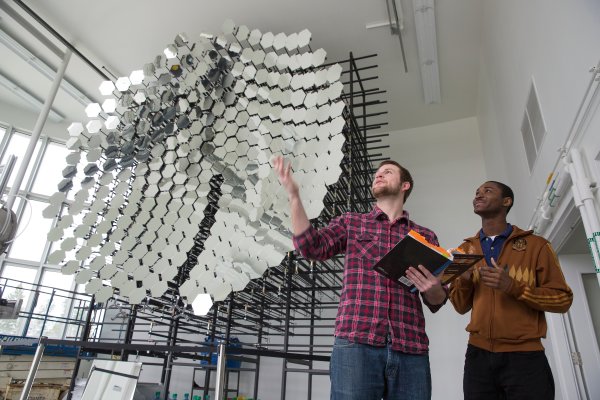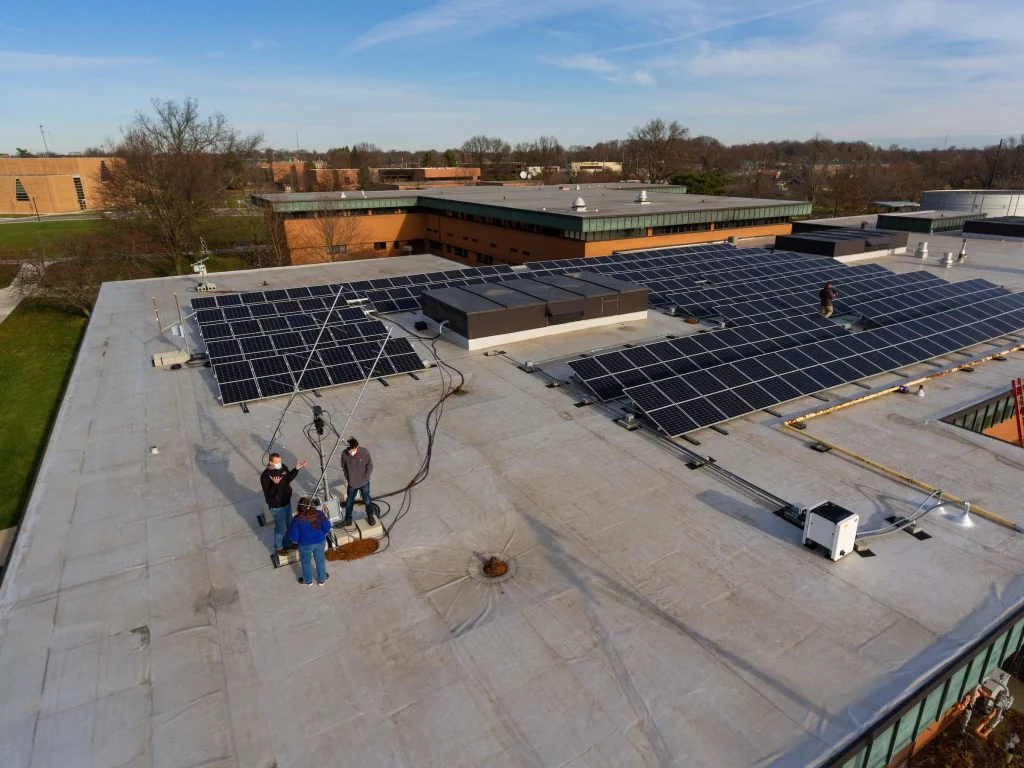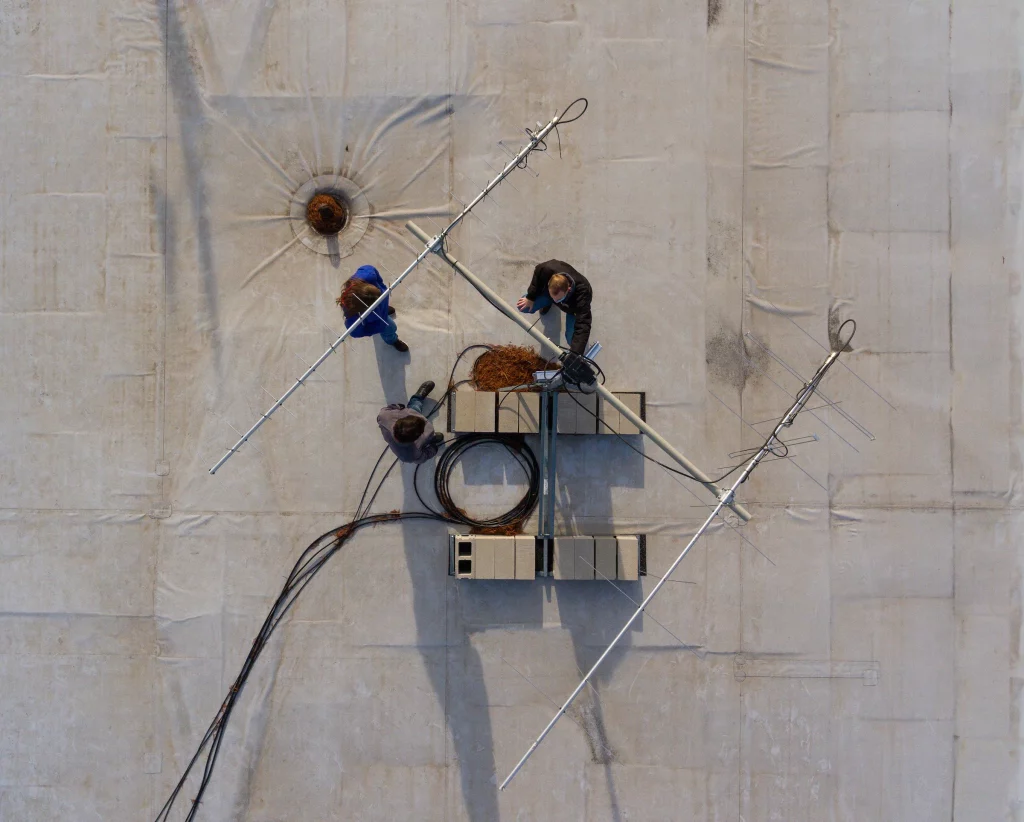Wired for Success with Wireless Experiences
In the world of computer programming, the exclamation point means “not,” or “opposite.” So when Dan White, Ph.D., associate professor of electrical and computer engineering, and his colleagues founded the !WIRED Lab — or the Wireless Research and Electronic Discovery Lab — in 2014, they were really conveying that the program had a focus on wireless technology. Since its inception, the facility has been an invaluable source of hands-on opportunities for students looking to get into the field of electrical engineering.
“The point of the lab is for students to work on projects,” Professor White explains. “We’ll have students working on larger projects like global networks, and then, since we have the resources, equipment and space, if students are interested in the things I’m interested in, they don’t have to work on the main projects. If they want to do something just on the side, I’ll support them. I’ll take anybody.”
From an early age, Professor White wanted to pursue a career with NASA, utilizing the aerospace engineering program at Iowa State University, near where his family lived. A move to Nebraska resulted in a goals realignment, and he moved on to study mechanical engineering and French horn performance.
“I discovered that I was good enough to be in the orchestra, but not good enough to get the one open slot a year for French horn that pays the bills,” Professor White says. “Then I ran sound for a church in Lincoln Nebraska, and switched to electrical engineering to keep my fingers in music.”
That pursuit of electrical engineering led Professor White to remain in higher education to obtain his master’s degree, which he did in part by designing a computer chip. While in that program, he was asked to teach an electronics course, which led him to discover a love for teaching that resulted in obtaining his Ph.D. and entering higher education. In 2014, he was hired at Valparaiso University.
“I was in Seward, Nebraska, and there were people who had heard of Valpo, and it turned out that President Alan Harre was living in Seward,” Professor White says. “Once I got here and saw his picture I went ‘I’ve seen this guy in the grocery store.’”
During this time, Professor White did not fully abandon his interest in what engineering could accomplish in space. He is a founding member of Amateur Radio on the International Space Station (ARISS) education committee and a core contributor to the Libre Space Foundation, an international organization that provides open-source plans for space technologies.
A year after joining the faculty, Professor White was involved in creation of the !WIRED Lab, a place where he would turn all of his previous passions — from outer space to microchips — into opportunities for Valpo students.
The facility’s primary focus is on radio, as evidenced by the array of antennas sticking out of the roof of the west wing of the Gellersen Center for Engineering and Mathematics. One advantage of the field is the low cost and time commitment for students just starting to explore their interest in radio.
“You can build an antenna out of a coat hanger, and the radio signal doesn’t know how much you paid for the hardware,” Professor White explains. “We can be listening to satellites with hardware that a student has built in a day.”
Another advantage of working with radio is that it can give students the real-world experience of obtaining amateur licensing from the FCC. Despite being relatively simple to obtain (Professor White estimates that a freshman could study the required knowledge in about two weeks), having the license can be a game-changer for a recent graduate’s job search.
“There are plenty of students that get their amateur radio license, which looks great on their resume,” Professor White says. “An interviewer sees that call sign and the next thing they know, the interview is over. It shows that you took some extra effort. It’s evidence that you can do things, that you do those things, and that you do more than just showing up to class and turning in your homework.”
Working with radio isn’t the only kind of project that the !WIRED facility supports. After the University was unable to provide a chip design course due to logistical limitations, Professor White supported five interested students in an independent study that supported their interest while being a self-motivated endeavor.
“I walked them through the materials we would have gone through, but I was also teaching at the time,” Professor White says. “I couldn’t be there so many hours a week, so it really was independent.”
Recently, Professor White has had the opportunity to turn his attention towards the stars As the Dale E. Kempf Professor of Emerging Technology, Professor White and three of his students are currently in the process of designing a CubeSat, a small satellite capable of relaying information from orbit back to Earth. Previously impractical due to such a project’s cost and length — a sophomore who started the project would have graduated long before it saw completion — new advances in technology have brought the project down to a far cheaper, two-year endeavor.
Professor White’s team is utilizing and refining the open-source plans available from the Libre Space Foundation, and is currently in the process of designing a working desktop model. During the design and development, Professor White will use the time off from teaching provided by the Dale E. Kempf professorship to find grants and other funding options to put their project into orbit.
“There will be a company with a large satellite paying for the rocket, and they’ll sublease space on it,” Professor White says. “The rocket goes up, the stages separate, then they’ll literally just chuck these ones off the side.”
Regardless of the scope of the project, Professor White is a firm believer in the benefit of practical experience in the field of engineering, especially when entering the job market.
“Once you’re out of school, the skill of doing homework assignments or taking exams, those aren’t what engineering is like,” Professor White says. “An employer wants to know that you’ve done stuff — that you’ve started and completed projects. If you’re doing legitimate projects, somewhat independently, that’s the end of the conversation.”
Aaron Shaw ’24 owned and operated a small construction company for twelve years before attending Valpo to earn his degree in computer engineering. During his time here, he has worked on a CubeSat simulator project, as well as an independent study on printed circuit boards.
“Being able to put these unique opportunities on my resume has certainly made me stand out to employers,” Aaron says. “I have accepted an internship at Caterpillar this summer and I feel as though to a large extent I can credit my offer to our work on the CubeSat. During the interview I was asked about it and amazed the interviewers and even myself with the depth of knowledge I had on the subject due to Professor White’s teaching.”
The !WIRED lab is a fantastic example of the University’s dedication to learning and thriving, as defined in the five-year strategic plan Uplift Valpo: Our Beacon for the Journey Forward. Moreover, it gives students a hands-on opportunity for solving real-world problems, helping them grow as experts and professionals in their field.
Current students aren’t the only ones reaching for the stars. Read about the Valpo alumna who played a vital role in one of our greatest leaps forward in space exploration here.


